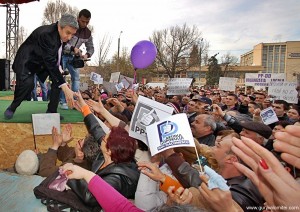A heated debate in today’s Romanian politics regards the prospects of PP-DD (Partidul Poporului Dan Diaconescu) to join the governing coalition of the Social-Democrat Union (consisting of the Social Democrat Party, the National Union for the Progress of Romania, the Conservative Party, and the Magyar Democratic Union from Romania). Whilst the press keeps on publishing articles and making speculations on whether or not Simona Man would become the Minister of Romanians Abroad, or if Dan Diaconescu gets the Ministry of Transport, negotiations are still going on and the results are yet to be revealed.
However, a question of paramount importance arises, and this article will tackle it: To what extent does PP-DD have any allegiance to the social-democratic doctrine?
PP-DD is known as a populist party that tends to have very radical views and it is hard to imagine how such a political group can co-exist in a social-democratic coalition. But there is a better way of understanding the nature of PP-DD, other than watching their television shows or reading the radical claims from their website: since the party has been in parliament since December 2012, an answer can be found in the parliamentary bills of their group – as usually in the case of populist parties, there is a difference between discourse and activity.
After the elections of December 2012, PP-DD has gained 21 seats into the Senate and 47 in the Chamber of Deputies. At the time when this paper had been written, the party has only 19 deputies, as the senators have all moved into another party – especially UNPR and PSD (as acknowledged even by the website of PP-DD; this points out to a slight compatibility with the governing coalition, yet the argument is shallow). Thus, the senatorial group of Dan Diaconescu’s party has had a life span of only 14 months – from December 2012 to February 2014 (when even the president of the group has changed his affiliation).
Therefore, this small research revolves around the key status-quo figures amongst the PP-DD MPs (who only have a group in the Chamber of Deputies nowadays): Cătălin-Daniel Fenechiu (the leader of the group), Luminița-Pachel Adam (vice-leader of the group), Tudor Ciuhodaru (the other vice-leader), and Liliana Mincă (secretary of the group).
The results will show a more precise ideological stance of PP-DD, discrepancies between party agenda and legislative actions (if any), but also the parliamentary groups their MPs collaborate with when drafting bills.
The People’s Party Dan Diaconescu (PP-DD) is a political party that was established in 2010 and had gained support through the television channel OTV. For those who are not acquainted with OTV, it is a tabloid TV channel that revolves around its founder and main show host, Dan Diaconescu, who presents “Sensational” news every night. From the moment Dan Diaconescu has created his own party, an important shift has occurred in the programming: the content has become more political and started to move away from the pseudo-celebrity scandals, conspiracy theories and promotion of pseudo-sciences. Dan Diaconescu had turned himself into a “Savior” of Romania, a man who started from the bottom, has reached a status of fame and fortune, and can relate to the needs of the average Romanian. The populist rhetoric did not stop here, as he often portrayed the political field in a very “Sodom and Gomorrah” manner, an evil apparatus that deprives the average citizen from being wealthy through taxes, and condemns the innocents. Needless to say, the savior of PP-DD was coming from the leader, Dan Diaconescu, a presidential candidate whose “when Karl Marx meets Jean Jacques Rousseau” agenda includes abolishment of all the taxes, provision of free welfare, funding of business start-ups, eradication of all the political legislative offices, creation of courts where people judge their former leaders, and removal of payments for high-ranked officials.
According to their official website and party platform, they are left-wing – as socialist reforms such as creating state institutions that are led “by the people”, re-establishing collective property for crops in villages, the abolishment of taxes, and the creation of popular tribunals that put status-quo politicians on trial. As of January 2012, the party has 1 million members: a number that had been reflected upon the popular vote at the legislative elections from December 2012 – since the 1 million milestone had slightly been surpassed.
The MPs of PP-DD have run for the elections with a very progressive left-wing agenda that bears reminiscences of the communist regime and also draws utopian ideas from the likes of Karl Marx and Jean Jacques Rousseau, with complete abolition of taxes and questionably-sustainable welfare. Under such promises that were supported by a little over one million voters, one might assume that bills regarding fundamental and radical changes have been forwarded into the Parliament. And rightfully so, the main members of the PP-DD group from the Chamber of Deputies have proved to be very active: their leader, Fenechiu Cătălin-Daniel, has 39 initiatives in 14 months. Other members, like vice-leaders Luminița-Pachel Adam and Tudor Ciuhodaru, have 49 and 89 initiatives respectively. The Secretary of the party, Mincă Liliana, also has 37 initiatives on her resume. Also, a quick overview of the number of the bills points to a large extent of legislative homogeneity: the members of the PP-DD group really support the bills they propose, such as bill 35/2014 regarding the law that settles the functioning of the Romanian Radiofusion Society and the Romanian Television Society (which was initiated and forwarded to the Senate solely with the power of the PP-DD group and a few independents), bill 37/2014 for the revision of the National Law for Education (which was initiated by the PP-DD MPs and supported by Social Democratic and Conservative deputies), and bill no. 155/2014 regarding the status of deputies and senators (which is also pushed by the PP-DD MPs, with the help of one independent).
PP-DD promises the abolishion of the tax for public service television and radio, reforms in education, and also the abolishion of the indemnizations for high-ranked officials. But on a closer look at the bills, the terms under which they are presented is different from the radical party platform: the public service television and radio stations are not to be closed down, but to become optional to the citizens – moreover, the argument is based on a strictly capitalist argument regarding disloyal competition; the education system is not to suffer fundamental changes, as the bill merely proposes that a course on health should be introduced into schools; last but not least, the bill on the status of deputies and senators does not seek to „Evacuate the politicians from the Palace of Parliament, the Government House and Cotroceni Palace” as their 10th promise as a political party stipulates – but tries to push for an abolishment of affiliation change during office on behalf of the officials. This micro-scale qualitative analysis of the bills points to an ideological conflict: PP-DD poses as a left-wing populist party, but at the same time tries to push very liberal laws. Indeed, the party has faced a loss of MPs (which concluded with the dismemberment of their senatorial group), and their leader has an interest in stopping the public service television from being widespread, and at the same time takes pride in reforming the system. However, the reasons behind the bills are not the object of study in this article, and neither is the intellectual autonomy of the MPs. But in terms of communication with their supporters, the party poses as a radical reform-bringer and puts the blame on the system for not succeeding, thus transforming the mission into a long-term struggle in which votes can easily be capitalized. The populist-flavored „us and them” rhetoric will always bring the support of those who lost trust in the party system. Another aspect that should be noted is that the parliamentary group which seems to provide the most support to PP-DD on current bills is PSD – mostly due to the switch of many former PP-DD MPs to the governing social democrats.
Furthermore, in order to test the theories and assumptions, three bills that are still under committee revision and not shared by the key figures of the party will be put on trial. This will show an extent to which the PP-DD group socializes and collaborates with the others:
a) First of all, the group leader Cătălin-Daniel Fenechiu has bill no. 238/2014, which is initiated by one member of PSD, PNL, PC, PDL, and PP-DD. It aims to change the law of local advertisement, in order to help small businesses promote themselves. Given the fact that equal chances on the market is a key feature of capitalism, then the draft can be regarded as being quite liberal – in a classical sense. However, in the contemporary terminology, liberalism is often associated with the neo-liberal movement, therefore the alignment of the bill is on the center-left side – close to the social democratic ideology.
b) Secondly, Luminița-Pachel Adam – one of the vice-leaders of the party, has taken part to the initiation of bill 187/2014, which asks for a modification in the Fiscal Code, so that bee growers receive subsidies for transports which increase productivity. Those who signed the bill come from PSD, PNL, PDL, UDMR, and PP-DD. The idea behind it is definitely left-wing.
c) Thirdly, the other vice-leader, Tudor Ciuhodaru, has a peculiar parliamentary activity: most of his bills are drafted along with fellow PP-DD party members or self-drafted. On the latter case, a perfect example is bill 52/2014, in which he tries to secure public schools and hospitals with an investment in access cards – so that people not related to the institutions can no longer have access. The reasoning behind the bill is that of preventing crime, and the content is in tune with the party’s fight against crime and corruption.
d) Last but not least is the secretary of the parliamentary group, Liliana Mincă, who initiated a draft along with over 60 PSD deputies, and a few PNL, PC, and PP-DD members. The aim of the bill is that of expanding the gender equality in Romania. This implies the establishment of a national specialized agency, and other administrative measures that are to be taken in order to ensure of proper gender-equality environment.
The results, despite the fact that they are not globally-applicable (as not all the bills were taken into consideration), point out to a clear pattern: the PSD and PNL groups had been co-opted in 3 of the 4 bills issued by the key figures. However, the numbers show that the social democrats provide the most support and they have a certain compatibility with the PP-DD policy agenda. The compatibility with the governing coalition is clearly pointed by the bills that were also drafted along with MPs of PC and UDMR.
As a parliamentary group, PP-DD is weak and follows a trend of losing members in favor to the bigger parties – especially the Social Democrats. Despite posing as a progressive left-wing group with radical views, the parliamentary activity of the party’s MPs suggests a moderate approach to politics. In the eyes of many, Dan Diaconescu’s party is something that came out of thin air: as even the “History” section on the official website is empty. However, there is a difference in discourse between the public agenda of the party and the actual legislative activity. The texts seem to be radical and extremist to some extent, but the actions of the elected officials to not lead to one of these conclusions. Ironically, the “Doctrine” section on the PP-DD website is also “under construction”, thus showing a lack of identity and long-term goals, and an activity that is shaped in the process, during the turning of events. But in spite of all the public relations activity, the legislative orientation of the party seems to be indeed left-wing, with a close resemblance to the Social Democratic Party. Moreover, the deputies who are still members of the group appear to be homogeneous and support each other’s bills on a common platform. They do try to bring changes, but not as radically as mentioned in the party publicity.
In conclusion, PP-DD is not exactly the party that both their television and website, but also mainstream media channels are presenting. The party leaders may have certain claims, but the actual political behavior is contradicting. Why would someone who on his television channel fights against the system want to join the government he fights against, anyway? It is not clear whether a shift towards a more moderate approach to politics is being made inside Dan Diaconescu and Simona Man’s party, or a complete encapsulation of PP-DD inside the social democratic mother ship is in process. But if the governing coalition is willing to entrust a political party with ministerial functions, in spite of the repulsion of the public opinion and the criticism of the media, then it should know better.
Image Sources:
1. http://www.enational.ro/wp-content/uploads/2012/10/agerpres_dan-diaconescu.jpg
2. http://www.ziuaconstanta.ro/images/stories/2014/05/30/ppdd.jpg
3. http://ppdd.ro/images/congres_ppdd_1-500.jpg?1343258567
4. http://milcovul.ro/wp/wp-content/uploads/2012/01/congres_ppdd1.jpg
5. http://scheauion.ro/wp-content/gallery/lansare-candidati-ppdd-arad/ppdd.jpg
Sources:
5. http://www.cdep.ro/pls/proiecte/upl_pck.proiect?idp=13943
6. http://www.cdep.ro/pls/proiecte/upl_pck.proiect?idp=13206
7. http://www.cdep.ro/pls/proiecte/upl_pck.proiect?idp=14007
8. http://www.cdep.ro/proiecte/2014/000/30/5/em35.pdf
9. http://www.cdep.ro/proiecte/2013/100/10/0/em195.pdf
10. http://www.cdep.ro/proiecte/2014/100/50/5/em155.pdf
11, http://www.cdep.ro/proiecte/2014/200/30/8/em349.pdf
12. http://www.cdep.ro/proiecte/2014/100/80/7/em294.pdf
13. http://www.cdep.ro/proiecte/2014/000/50/2/em64.pdf
14. http://www.cdep.ro/proiecte/2013/400/00/5/em705.pdf
15. http://www.cotidianul.ro/simona-man-ministrul-ppdd-in-guvernul-ponta-239051/
17. http://www.partidul.poporului.ro/content/partidul-poporului














